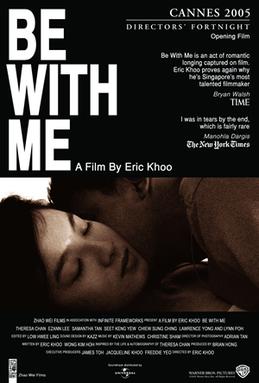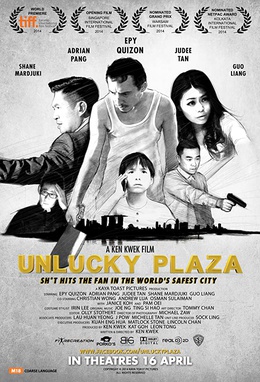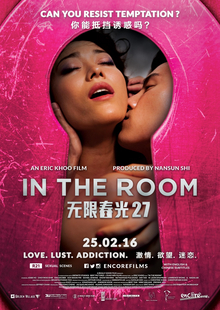
Despite having a flourishing Chinese and Malay film industry in the 1950s and 1960s, Singapore's film industry declined after independence in 1965. Film production increased in the 1990s, which saw the first locally produced feature-length films. There were a few films that featured Singaporean actors and were set in Singapore, including Saint Jack, They Call Her Cleopatra Wong and Crazy Rich Asians.

I Not Stupid is a 2002 Singaporean comedy film about the lives, struggles and adventures of three Primary 6 pupils who are placed in the academically inferior EM3 stream. Written and directed by Jack Neo, and produced by Mediacorp Raintree Pictures, the film stars Huang Po Ju, Shawn Lee, Joshua Ang, Cheryl Desiree Chan, Xiang Yun, Jack Neo, Richard Low and Selena Tan.

Be with Me is a 2005 Singaporean drama film directed by Eric Khoo. The film is inspired by the life of deafblind teacher Theresa Poh Lin Chan. It premiered as the Director's Fortnight selection in the 2005 Cannes Film Festival. It was also the official entry from Singapore for the 78th Academy Awards in the foreign language category. In December 2005, the academy body disqualified the film on grounds that the dialogue is mainly in English. Out of 93 minutes, the film only has two and a half minutes of dialogue.

Damien Sin, born Foong Yu Lei, was a Singaporean author, poet and musician. He has written several bestselling books published by the Angsana Books imprint of publisher Flame Of The Forest Publishing. Sin died in 2011.

Richard Lee Peng Boon is a Singaporean singer-songwriter, playwright and film director. Lee was awarded the Cultural Medallion, Singapore's pinnacle arts award, for music in 2005.

Eric Khoo Kim Hai is a Singaporean film director and producer who is often credited for the revival of the Singapore modern film industry.

Mee Pok Man is a 1995 Singaporean film directed by Eric Khoo. The film is Eric Khoo's debut feature, released under his film production company, Zhao Wei Films, after making award-winning short films for years. It was entered into the 19th Moscow International Film Festival and showed at more than 30 film festivals worldwide, winning the FIPRESCI Award.

The Undesirable Publications Act 1967 (UPA) is a Singapore statute which, according to its long title, prevents the importation, distribution, or reproduction of undesirable publications and for purposes associated in doing so. The Act, which was passed in 1967 empowers the Government of Singapore in incriminating and punishing both individuals and corporates that are involved in the sale, supply, exhibition, or distribution of obscene and objectionable publications.
Jacen Tan is a Singaporean independent film director, and has been named by The Straits Times Life! as one of Singapore's "most exciting young talents" and “Singapore's latest film funnyman”.

12 Storeys is a 1997 Singaporean drama film written and directed by Eric Khoo. It features an ensemble cast of Jack Neo, Koh Boon Pin and Quan Yi Fong. It was screened in the Un Certain Regard section at the 1997 Cannes Film Festival.
Boo Junfeng is a Singaporean filmmaker. Boo's films, Sandcastle (2010) and Apprentice (2016) have been screened at the Cannes Film Festival, beginning with his debut film, Sandcastle, which was an Critics' Week nominee.

7 Letters is a 2015 Singaporean anthology drama film directed by seven different directors. It comprises seven short stories celebrating Singapore's 50th anniversary. The film was selected as the Singaporean entry for the Best Foreign Language Film at the 88th Academy Awards but it was not nominated.

Lang Tong is a 2014 Singaporean erotic thriller film directed by Sam Loh. It stars William Lawandi, Angeline Yap, and Vivienne Tseng. Yap and Tseng play sisters involved in a love triangle with a serial womanizer, played by Lawandi. It premiered uncut in December 2014 at the Singapore International Film Festival (SGIFF) and was released in Singapore on March 5, 2015. It caused some controversy in Singapore over its graphic sex scenes, three minutes of which were cut for its theatrical release.

Rubbers is a 2014 Singaporean sex comedy film written and directed by Han Yew Kwang. It stars Marcus Chin, Julian Hee, Lee Chau Min, Oon Shu An, Catherine Sng, Alaric Tay, and Yeo Yann Yann as Singaporeans who are faced with various problems in their sex lives related to condoms. The film is split into three shorts whose scenes are interwoven. It premiered at the Singapore International Film Festival on December 12, 2014. Golden Village released it theatrically on April 30, 2015, in Singapore, where it grossed $82,510.

The Songs We Sang is a 2015 Singaporean documentary directed by Eva Tang. It is about xinyao, Singaporean folk music that was popular in the 1980s.

Unlucky Plaza is a 2014 Singaporean black comedy thriller film written and directed by Ken Kwek. It stars Epy Quizon as a Filipino immigrant to Singapore who takes hostages after falling for a scam. It premiered at the Toronto International Film Festival and was released in Singapore on 16 April 2015. The story is told in a series of flashbacks from the point of view of a talk show that has reunited the captor and his former hostages.

1400 is a 2015 Singaporean drama film directed by Derrick Lui, in his directorial debut. Set in Singapore's red light district, with four interwoven stories, the film revolves around four couples in search of love and belonging in a hotel. The film stars Desmond Tan, Ya Hui, Vincent Tee, Alan Tan, Angeline Yap, Will Lawandi, Maria Alexandria and Grace Lee-Khoo.















